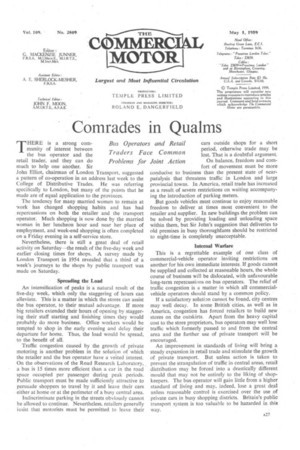Comrades in Qualms
Page 29

If you've noticed an error in this article please click here to report it so we can fix it.
THERE is a strong community of interest between the bus operator and the retail trader, and they can do much to help one another. Sir John Elliot, chairman of London Transport, suggested a pattern of co-operation in an address last week to the College of Distributive Trades. He was referring specifically to London, but many of the points that he made are of equal application to the provinces.
The tendency for many married women to remain at work has changed shopping habits and has had repercussions on both the retailer and the transport operator. Much shopping is now done by the married woman in her luncheon hour and near her place of employment, and week-end shopping is often completed on a Friday evening in a self-service store.
Nevertheless, there is still a great deal of retail activity on Saturday—the result of the five-day week and earlier closing times for shops. A survey made by London Transport in 1954 revealed that a third of a week's journeys to the shops by public transport was made on Saturday.
Spreading the Load An intensification of peaks is a natural result of the five-day week, which only the staggering of hours can alleviate. This is a matter in which the stores can assist the bus operator, to their mutual advantage. If more big retailers extended their hours of opening by staggering their staff starting and finishing times they would probably do more business. Office workers would be tempted to shop in the early evening and delay their departure for home. Thus, the load would be spread, to the benefit of all.
Traffic congestion caused by the growth of private motoring is another problem in the solution of which the retailer and the bus operator have a vested interest. On the observations of the Road Research Laboratory, a bus is 15 times more efficient than a car in the road space occupied per passenger during peak periods. Public transport must be made sufficiently attractive to persuade shoppers to travel by it and leave their cars either at home or at the perimeter of a busy central area.
Indiscriminate parking in the streets obviously cannot be allowed to continue. Nevertheless, retailers generally insist that motorists must be permitted to leave their cars outside shops for a short period, otherwise trade may be lost. That is a doubtful argument.
On balance, freedom and comfort of movement must be more conducive to business than the present state of nearparalysis that threatens traffic in London and large provincial towns. In America, retail trade has increased as a result of severe restrictions on waiting accompanying the introduction of parking meters.
But goods vehicles must continue to enjoy reasonable freedom to deliver at times most convenient to the retailer and supplier. In new buildings the problem can be solved by providing loading and unloading space within them, but Sir John's suggestion that deliveries to old premises in busy thoroughfares should be restricted to night-time is completely unacceptable.
Internal Warfare This is a regrettable example of one class of commercial-vehicle operator inviting restrictions on another for his own immediate interests. If goods cannot be supplied and collected at reasonable hours, the whole course of business will be dislocated, with unfavourable long-term repercussions on bus operators. The relief of traffic congestion is a matter in which all commercialvehicle operators should stand by a common policy.
If a satisfactory solution cannot be found, city centres may well decay. In some Britishcities, as well as in America, congestion has forced retailers to build new stores on the outskirts. Apart from the heavy capital cost to the store proprietors, bus operators may well lose traffic which formerly passed to and from the central area and the further use of private transport will be encouraged.
An improvement in standards of living will bring a steady expansion in retail trade and stimulate the growth of private transport. But unless action is taken to prevent the strangulation of traffic in central areas, retail distribution may be forced into a drastically different mould that may not be entirely to the liking of shopkeepers. The bus operator will gain little from a higher standard of living and may, indeed, lose a great deal unless reasonable control is exercised over the use of private cars in busy shopping districts. Britain's public transport system is too valuable to be hazarded in this way.




































































































